Best mountain bike wheels – the lightest cross-country options to the strongest downhill MTB wheels
Upgrading to the best mountain bike wheels is one of the most significant modifications you can make to your bike, resulting in better overall control and more speed on the trail
- 1. Best MTB wheels for cross-country overall
- 2. Best value MTB wheels for cross-country
- 3. Best lightweight MTB wheels for cross-country
- 4. Best tough MTB wheels for cross-country
- 5. Best hand-built MTB wheels for cross-country
- 6. Best cross-country MTB wheels for compliance
- 7. Best cross-country MTB wheels for tech
- 8. Best MTB wheels for trail/enduro overall
- 9. Best value MTB wheels for trail/enduro
- 10. Best build-quality MTB wheels for trail/enduro
- 11. Best bombproof MTB wheels for trail/enduro
- 12. Best trail/enduro MTB wheels for reliability
- 13. Best MTB wheels for downhill overall
- 14. Best budget MTB wheels for downhill
- 15. Best downhill MTB wheels for fast engagement
- How to choose the best mountain bike wheels
- How we test
The best mountain bike wheels will improve how your bike responds to various terrains and challenges. There are many factors like weight, stiffness, and rim width to take into consideration when choosing, and they are always changing depending on your mountain bike discipline. There is a huge variation in weight and size across the board, and there’s no one-wheel-size-fits-all situation.
As you'll see there is also a massive selection of top-performing wheel options which can make the choice of where to splash the cash difficult. Our experts have tested many of the best mountain bike wheels and split them into three separate categories – cross-country, trail/enduro, and downhill mountain biking – and picked out a mix of options in each based on price and performance. Cross-country mountain bike wheels should be light, whereas downhill wheels should be able to withstand heavy abuse. The best mountain bike wheels for trail and endurance riding balance these two factors.
If you are looking for something on a budget, our guide on budget MTB wheelsets is also a good place to look. Don't forget that wheels and tires should be considered as a system, so to get the most out of the best mountain bike wheels be sure to install them with a pair of the best mountain bike tires to maximize traction and control on your rides.
Read on for our complete list of the best mountain bike wheels, and if you're not sure what to look for, skip to the bottom for our advice on how to choose your next set of wheels.
The best mountain bike wheels for cross-country
Why trust BikePerfect
1. Best MTB wheels for cross-country overall
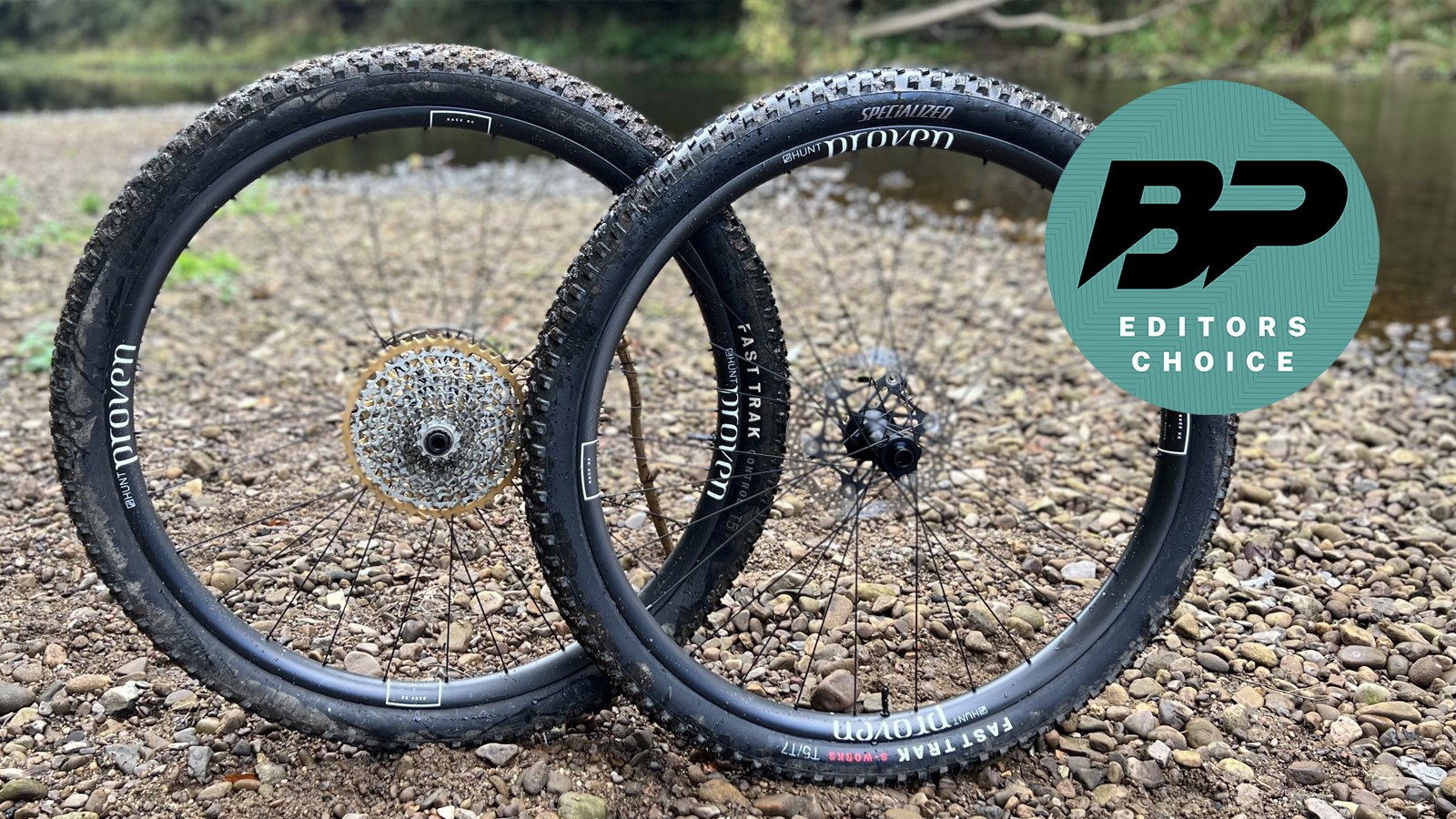
Specifications
Reasons to buy
Reasons to avoid
Guy Kesteven gave the Hunt Proven Carbon Race XC wheels top marks and therefore they took the best overall XC wheelset award in our best mountain bike wheels guide. Guy said the Hunt Proven's are some of the fastest wheels out there, and combined with the low weight, increased traction and better accuracy makes them a wheel that gives supreme riding confidence when riding hard.
The Hunt Proven range is race-tested and developed to deliver competitive performance at a more than competitive price. The Carbon Race XCs are 29mm wide internally at the bead lip (30mm at the base) with a depth of 22mm. They’re strung up with 28 Pillar TB1420 triple-butted and bladed straight pull spokes set into low-flange Hunt hubs. They’re only available in 29er with Boost axle widths, but then that’s what the vast majority of racers use so it’s not a big deal.
Hunt has strung up the triple-butted aero spokes to give a great balance. In our tests we found them precise enough to feel the knob-by-knob feedback through your brakes, but not so stiff they’ll fire off every rock and root at random. They’re a great blend of calmingly controlled when you’re losing it but still bright and sharply responsive enough when you want to lose everyone behind you.
Find out more in our full Hunt Proven Carbon Race XC review.
2. Best value MTB wheels for cross-country
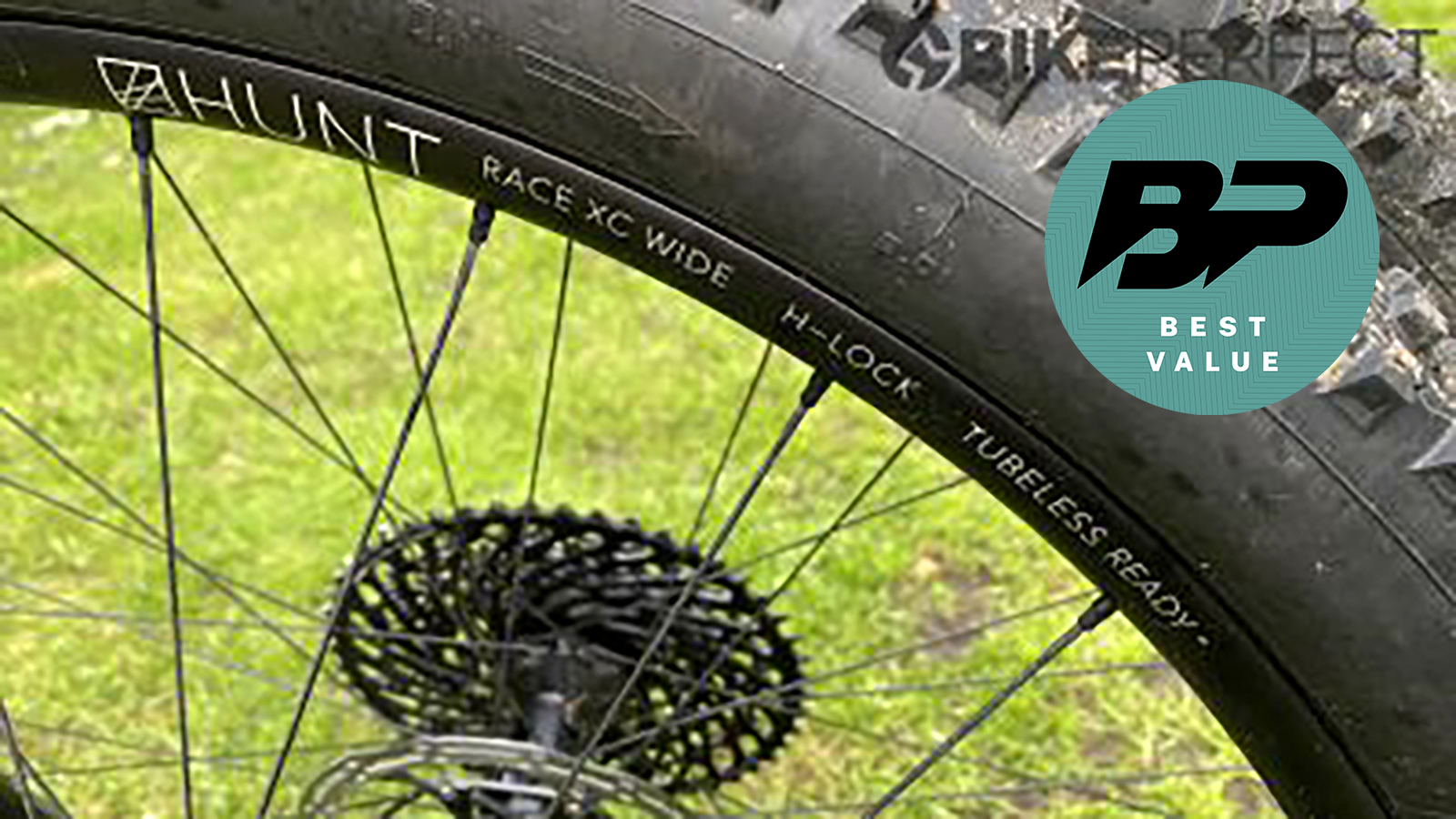
Specifications
Reasons to buy
Reasons to avoid
Another top scorer from Hunt is the Hunt XC Wide wheelset, Guy Kesteven was impressed by these super responsive, very light, bike and fitness flattering wheels. Aimed at aggressive XC riding, Guy noted that they offered tremendous value for money, saying the price makes them an absolute steal for the performance benefits they offer.
Hunt seems to offer an almost complete wheel package. Durable 6061 T6 alloy rims give superb support to tires between 2.1- and 2.5-in to maximize traction when climbing and in corners. The hubs have a snappy five-degree engagement and are available in boost or standard spacing. It might not be the lightest wheelset but for a bit more money, Hunt sells a Race version that proves alloy isn't dead, weighing in at a claimed 1,517g.
Read more about why the Hunt XC Wide is one of our top rated wheelsets.
3. Best lightweight MTB wheels for cross-country
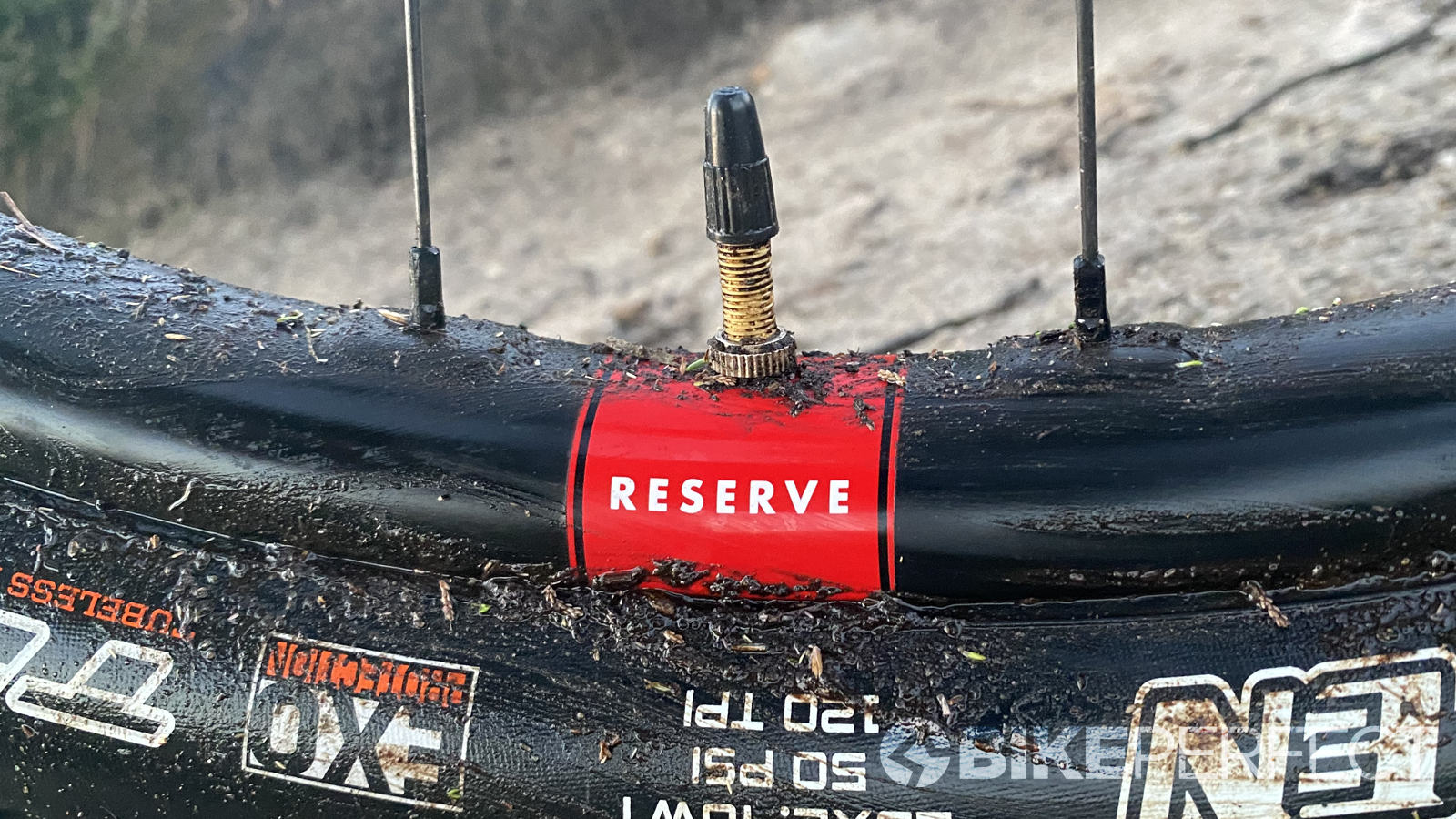
Specifications
Reasons to buy
Reasons to avoid
The Reserve 28XC are World Cup winning wheels and are a race-ready culmination of everything the brand has learned from years at the highest levels of competition. There are plenty of lightweight mountain bike wheel rivals to the Reserve 28XC, and they aren't even the lightest. However, Guy Kesteven noted that none of the rivals can match what the Reserves bring in terms of race-ready low weight, enhanced trail control, and a lifetime warranty.
They weigh in at a feathery 1,387g which is for a complete DT Swiss 180 hub wheelset with tape and valves (AND no rider weight limit and lifetime warranty). The 28XC also features a wider and lower rim profile than the previous XC race wheels, which increases strength and lateral rigidity while adding vertical compliance.
Guy also added that the new rim shape also eases tubeless tire installation and improves tire bead retention at lower pressure. The Reserve 28XC is sturdy and strong enough for a rowdy XC ride, but light and fast enough for a jaunt on the World Cup XC circuit.
Reserve gives the option to spec three different DT Swiss hub options, the 250, 240, or 180. As always, DT hubs offer excellent durability and simple tool-free servicing. The rims and hubs are also backed up by a superb warranty so you can ride hard mile after mile.
Learn more about the Reserve 28XC 350 wheels in our full review.
4. Best tough MTB wheels for cross-country
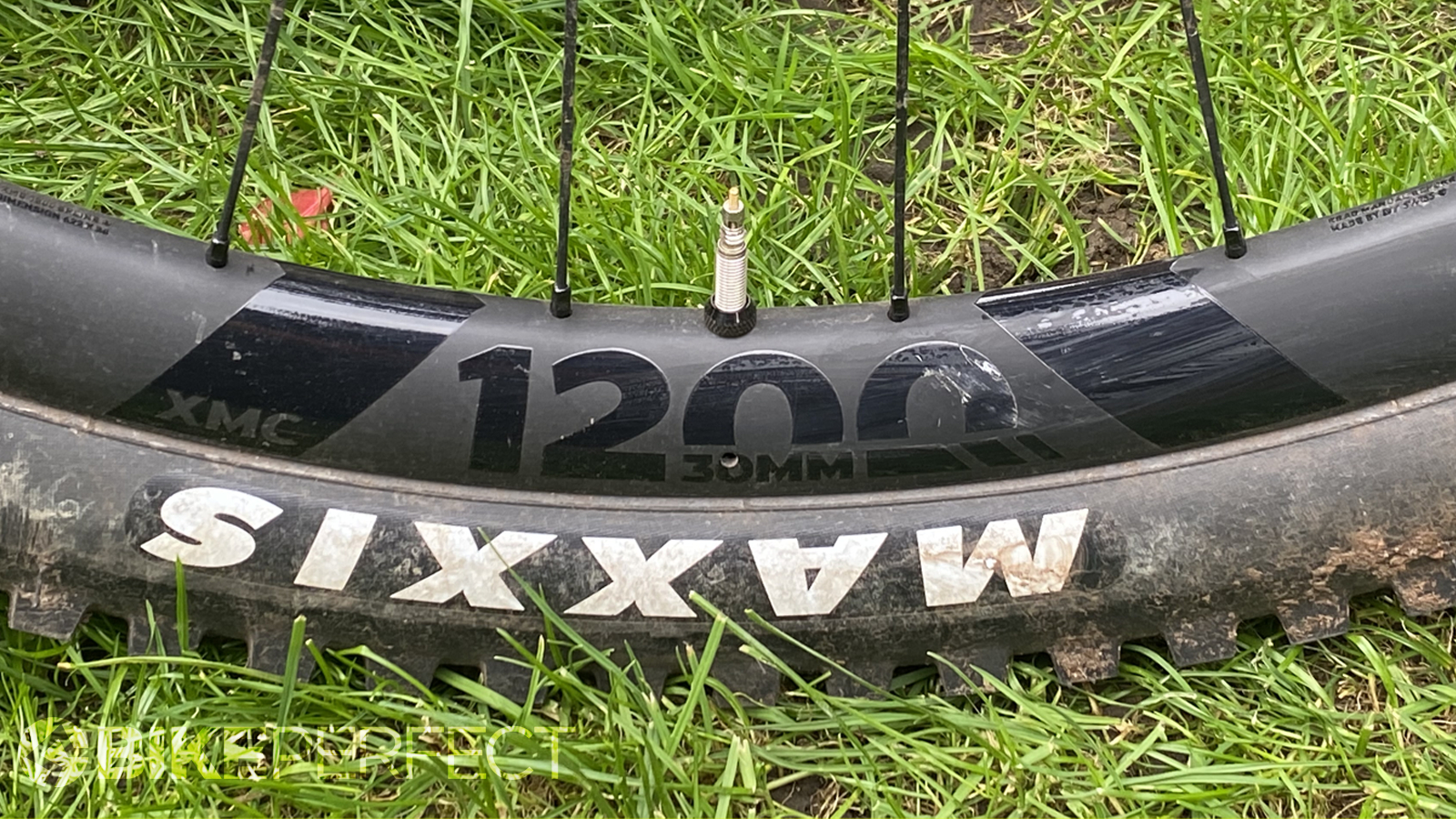
Specifications
Reasons to buy
Reasons to avoid
The DT Swiss XMC 1200 has super tough carbon rims and some seriously slick, light and easy to service ceramic hubs, which makes the DT Swiss XMC 1200s one of the best MTB wheelset options. In our review we noted that the carbon layup is specifically tuned for all-mountain use, and gives a superb XC lightness, but is also extremely durable with plenty of built in enduro toughness.
The hubs feature the latest incarnation of the DT Ratchet System along with refined machining and fully lasered graphics making them the lightest DT Swiss has ever made. Together with bladed top-end spokes and the perfect DT Swiss build quality you would expect, this wheelset is made to ride trails with speed and confidence, with trustworthy durability. But the price is reflective of that.
We noticed a boost in acceleration and plenty of stiffness on climbs and long pedally stretches of trail. Tracking over terrain, the XMCs are tight and precise, offering a good amount of feedback and traction.
Read our full DT Swiss XMC 1200 review to find out why we love their combination of low weight and durability.
5. Best hand-built MTB wheels for cross-country
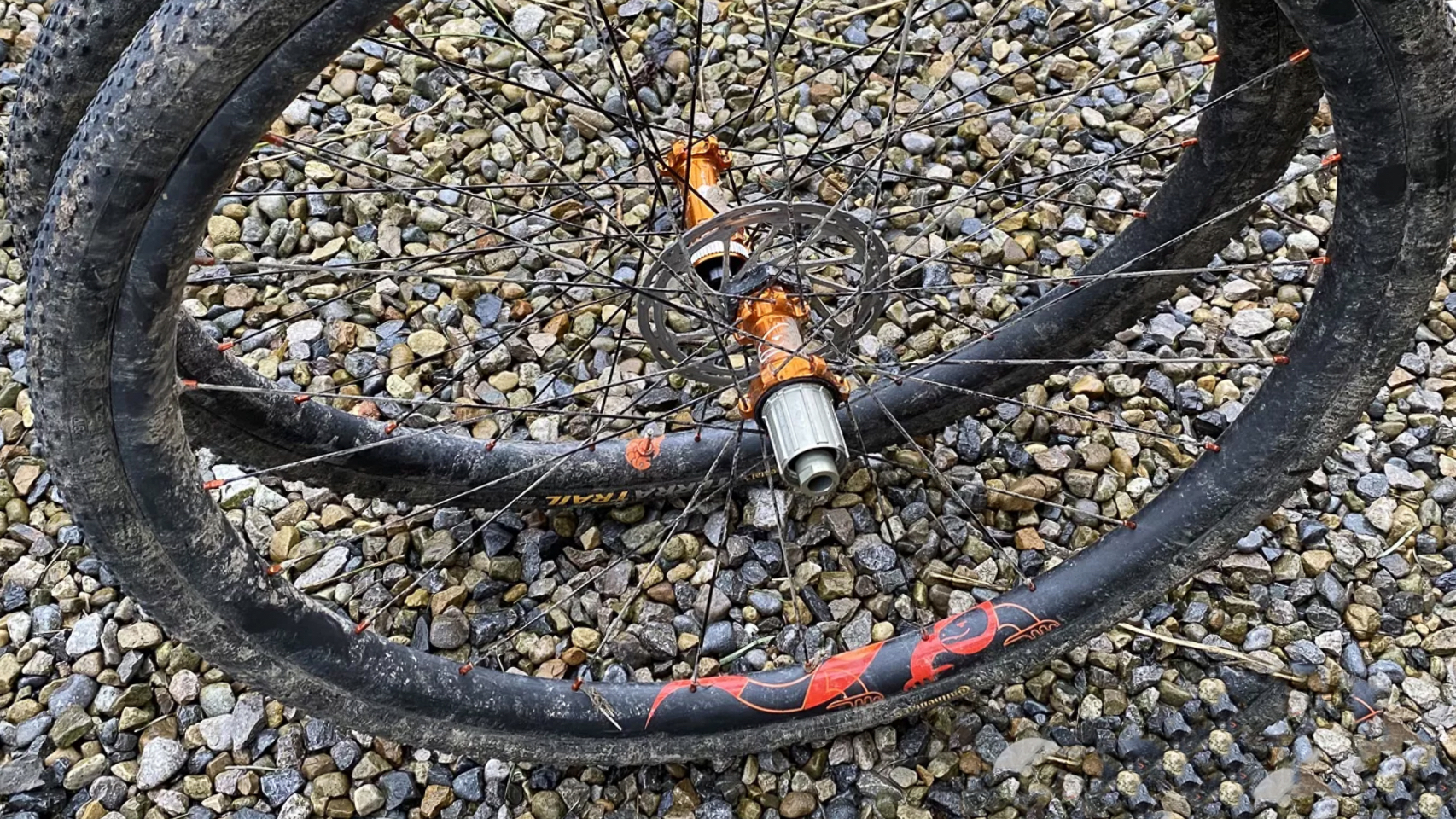
Specifications
Reasons to buy
Reasons to avoid
If custom hand built MTB wheels are on the radar then the Just Riding Along Monitor Wheels are well worthy of consideration. JRA has years of sourcing and hand-building experience to create what Guy Kesteven called – a true Goliath-killing, pitch-perfect wheelset for riders who want crazy low weight MTB wheel.
These custom carbon gravel and XC wheels are hand-built in Yorkshire, England. Weighing just 1,350g for the pair, the Just Riding Along Monitors are incredibly lightweight yet surprisingly robust. Since they're a custom build, you can choose to have them exactly how you want them, with custom color and configuration options giving a truly personalized artisan wheelset.
Choose between 650b or 29er rims, 24 or 28 holes, J-bend or straight-pull spokes, and Centerlock or 6-bolt disc hubs. You can decide the spoke count, the freehub, opt for boost spacing, and choose custom colors for the nipples and decals. Finally, you can add on optional tubeless valves.
Whatever you opt for, Guy noted that the super low weight of these wheels will give your ride an instant boost in acceleration, while the freehub's fast engagement helps pedal strokes feel responsive. Guy also added that after several months of punishing them off-road, exposing them to cobbles, mud, and grit, they held up exceptionally well and he had no issues.
To find out more about why the Just Riding Along Monitor is one of our favorite XC and gravel wheels, be sure to check out the full review.
6. Best cross-country MTB wheels for compliance
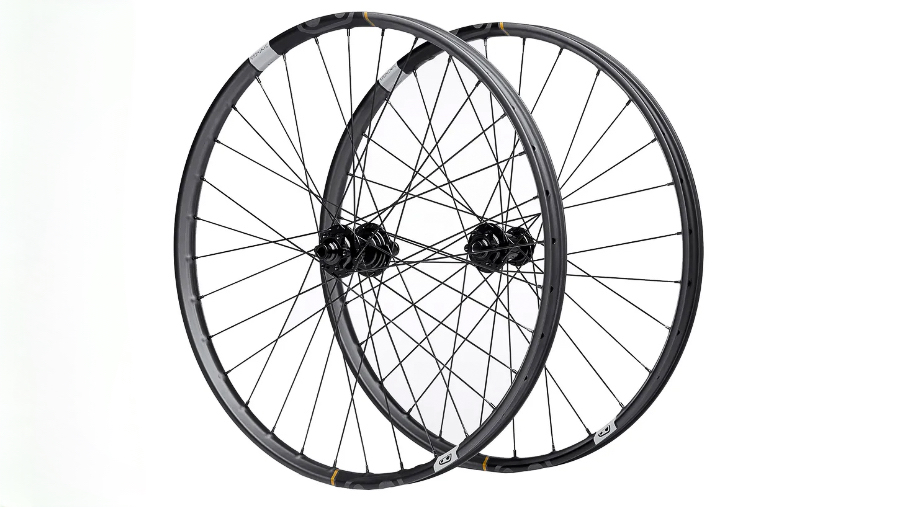
Crankbrothers Synthesis XCT Carbon
Specifications
Reasons to buy
Reasons to avoid
Crankbrothers has tuned its Synthesis wheelset to achieve a difference in ride quality and lateral flexibility between the front and rear by using different rim profiles and spoke counts.
The Synthesis front wheel only has 28 spokes, while the rear is laced with 32. Internal rim widths differ too: they are wider at the front than the rear. Crankbrothers believes that a front wheel should be more forgiving, as it is responsible for turning the bike and experiences severe terrain deflections that could ruin steering feedback dynamics.
Crankbrothers offers three different alloy Synthesis wheelsets, with front/rear-specific build. The brand’s Synthesis XCT is a lightweight 29-inch option, featuring a 24.5mm internal diameter rear wheel and 26.5mm internal diameter front, the total weight of which tallies 1,554g.
7. Best cross-country MTB wheels for tech

Specifications
Reasons to buy
Reasons to avoid
Zipp’s 1Zero Hitop uses a traditional box section but with a low 21.2mm deep, 30mm internal width asymmetric shape and broad topped ‘winged’ sidewalls. The SW wheels get a lightened ‘SL’ super slim body version of the ZM2 hubs, and TyreWiz valves which measure tire pressure to within plus/minus two percent and transmit it to the SRAM AXS app via Bluetooth / ANT+ connectivity.
In our testing, we found them responsively light and fast-reacting, but tough enough to tackle serious trails with consistent control and resilient durability. They really shine in rough cornering situations where repeated jolts can push a wheel outwards, but they consistently keep turning in and holding course with comfortable control. The TyreWiz valves are also surprisingly useful, particularly in race/epic situations where you might otherwise not pick up pressure drop.
For more info, check out our full Zipp 1Zero Hitop SW review.
The best mountain bike wheels for trail and enduro
8. Best MTB wheels for trail/enduro overall
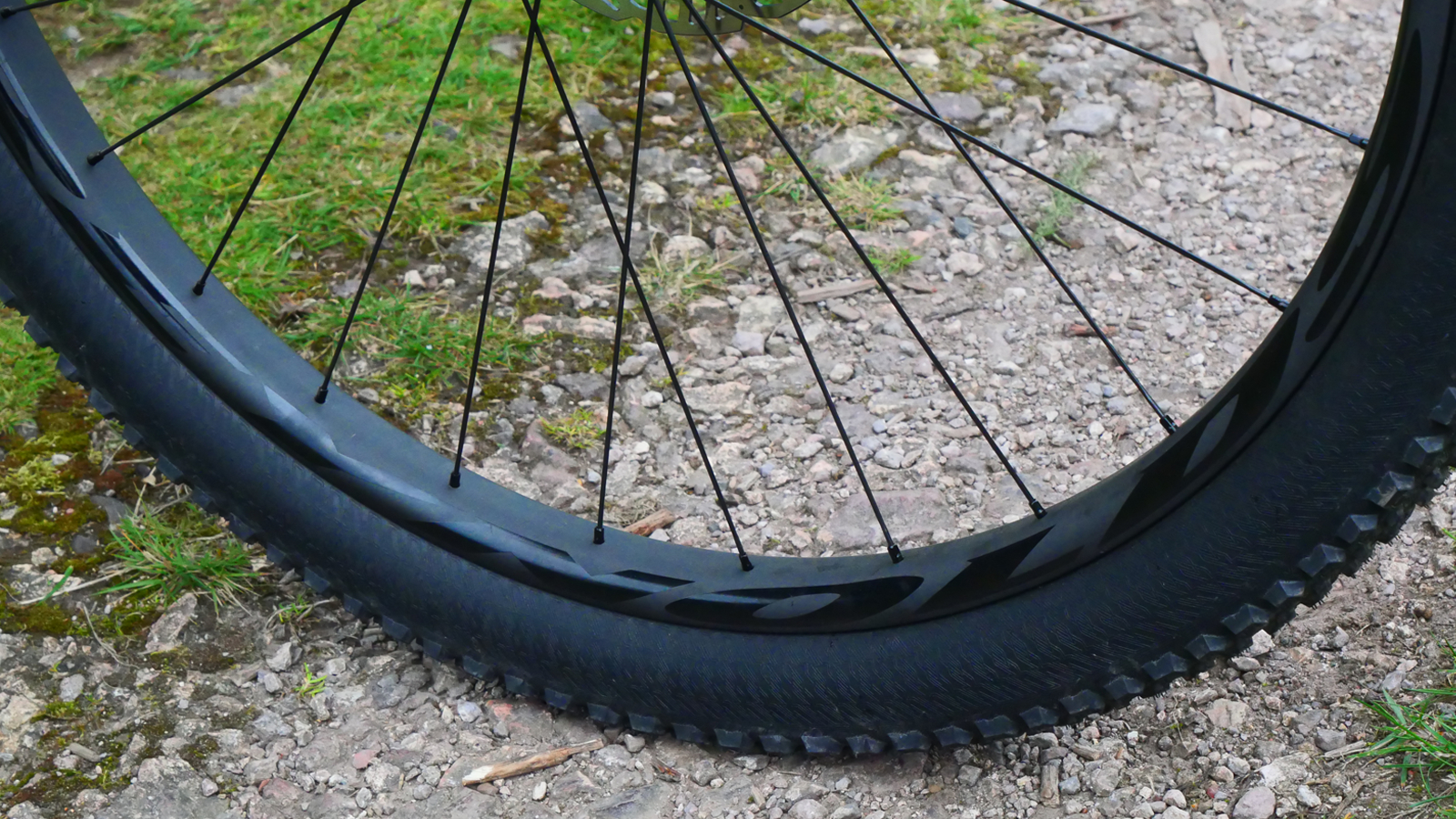
Specifications
Reasons to buy
Reasons to avoid
Graham Cottingham found the Reynolds Blacklabel 329 Trail Pro wheelset very hard to fault, and they delivered superb performance, durability, and versatility. Graham found them to have a balance between compliant and precision that made them a delightful and highly adaptable set of wheels, adding that they might just be – the last set of mountain bike wheels you ever need to buy.
The Reynolds Blacklabel 329 Trail Pro wheelset is energetic enough to ride on all-day downcountry missions and still has plenty of clout to cut it on enduro-level technical trials. Graham during his testing also noted that they delivered superb durability, with the spokes remaining tight and the rims running true even after an unexpected blow out.
They do come with what initially is an off putting cost, but when you factor in the lifetime warranty they come with and the fact your initial outlay will be spread over many years, the cost starts to become more justifiable.
If you're in the market for a super versatile trail/enduro wheelset, then check out Graham's full review of the Reynolds Blacklabel 329 Trail Pro wheelset to find out more.
9. Best value MTB wheels for trail/enduro
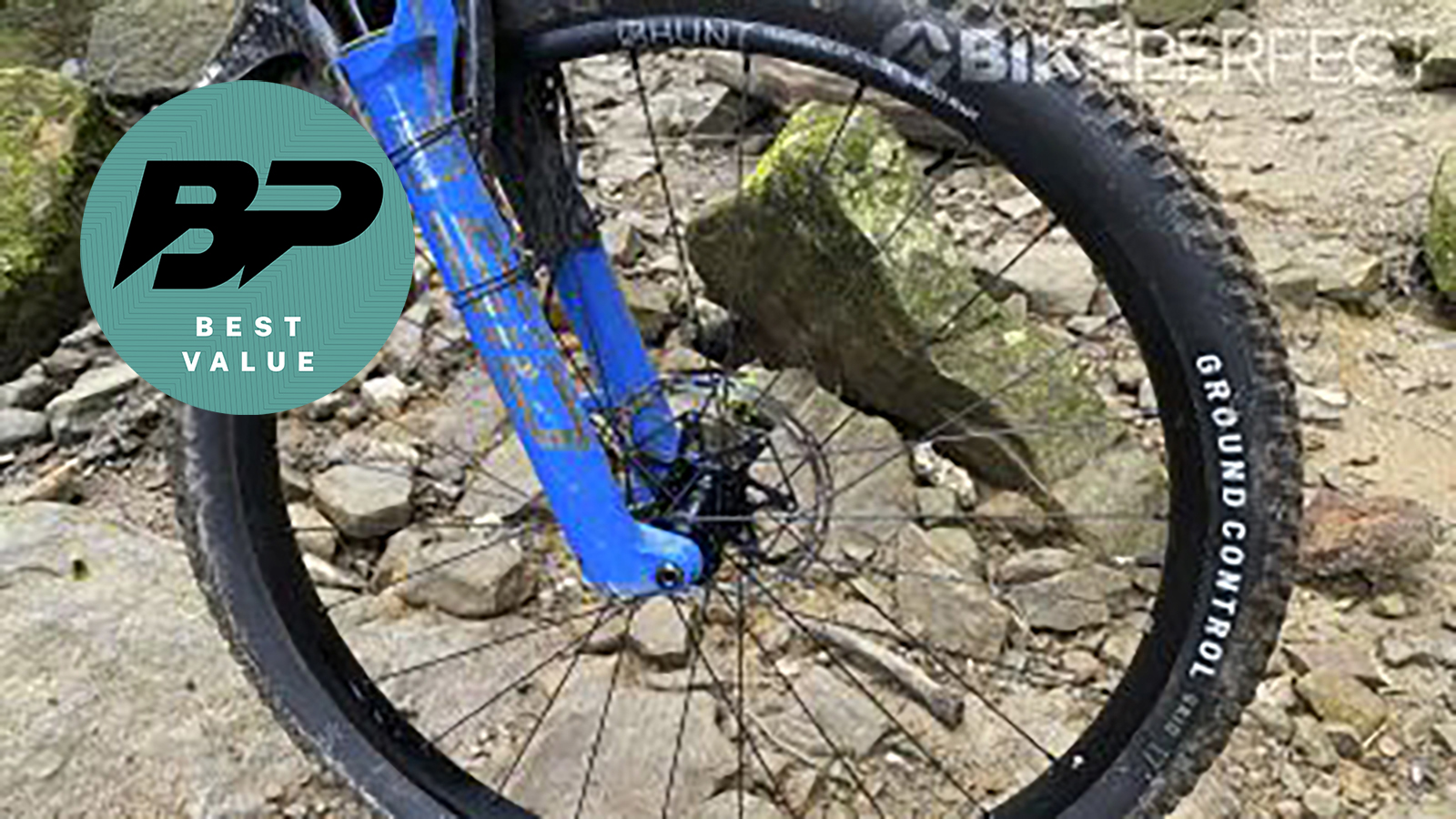
Specifications
Reasons to buy
Reasons to avoid
Another set of Hunt wheels that make our best mountain bike wheels guide are the V2 Trail Wide wheels. We were big fans of Hunt's original Trail Wide wheels, and these updated versions provide the same great performance including excellent ride quality, big tire support and an increase in rim toughness that make Hunt’s Trail Wide V2 an even better-value wheel proposition.
They feature a big burly build with more metal, which makes them heavier at around 1,800g and slightly slower to get up to speed, but they are still a fast and fairly light budget choice.
In our testing we found that when the going gets rough, the Trail Wides acted smooth and well connected, meaning they give good trail feedback, providing plenty of traction, and they remained composed in corners. Fans of rough trails will be happy with the durability of the wheels too since we never managed to dent them. Overall, these put more expensive wheelsets to shame, making them an excellent budget upgrade option.
For more on these great value for money wheels, see our Hunt Trail Wide V2 wheelset review.
10. Best build-quality MTB wheels for trail/enduro
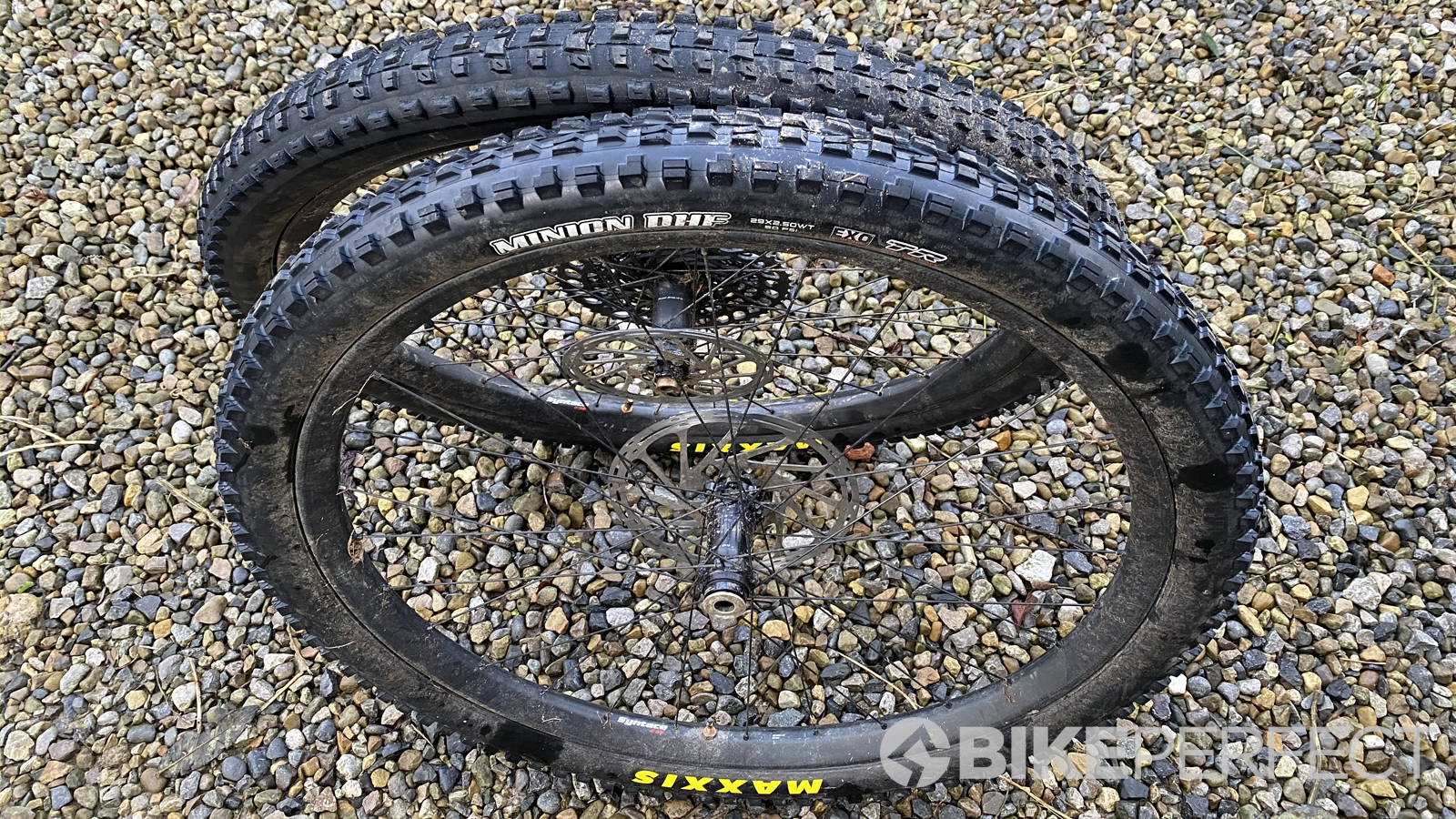
Specifications
Reasons to buy
Reasons to avoid
These carbon wheels from Syntace are great value for money, offering standout, responsive, and hyper-accurate performance for a fair price. The build quality is exceptional, with a triple sealing and reinforced freehub and bearings for extra durability.
They're available in 26-, 27.5- and 29-inch diameters with a choice of 28, 33, or 40mm internal rim widths. Pair these with rubber between 2.3- and 2.6-inches for an incredibly stable and supple ride feel. The carbon rims use various composite weaves, including cross-ply in the sidewalls for damage control.
It's no surprise seeing this kind of performance from Syntace, which was one of the first wheel brands to produce extra-wide rims. Pioneering fat tires for extra stability, the brand offers 80 wheel choices when you count all the different options available. It's fair to say it knows a thing or two.
To learn more about our thoughts on the Syntace C33i Straight Carbon 29, check out the full review.
11. Best bombproof MTB wheels for trail/enduro
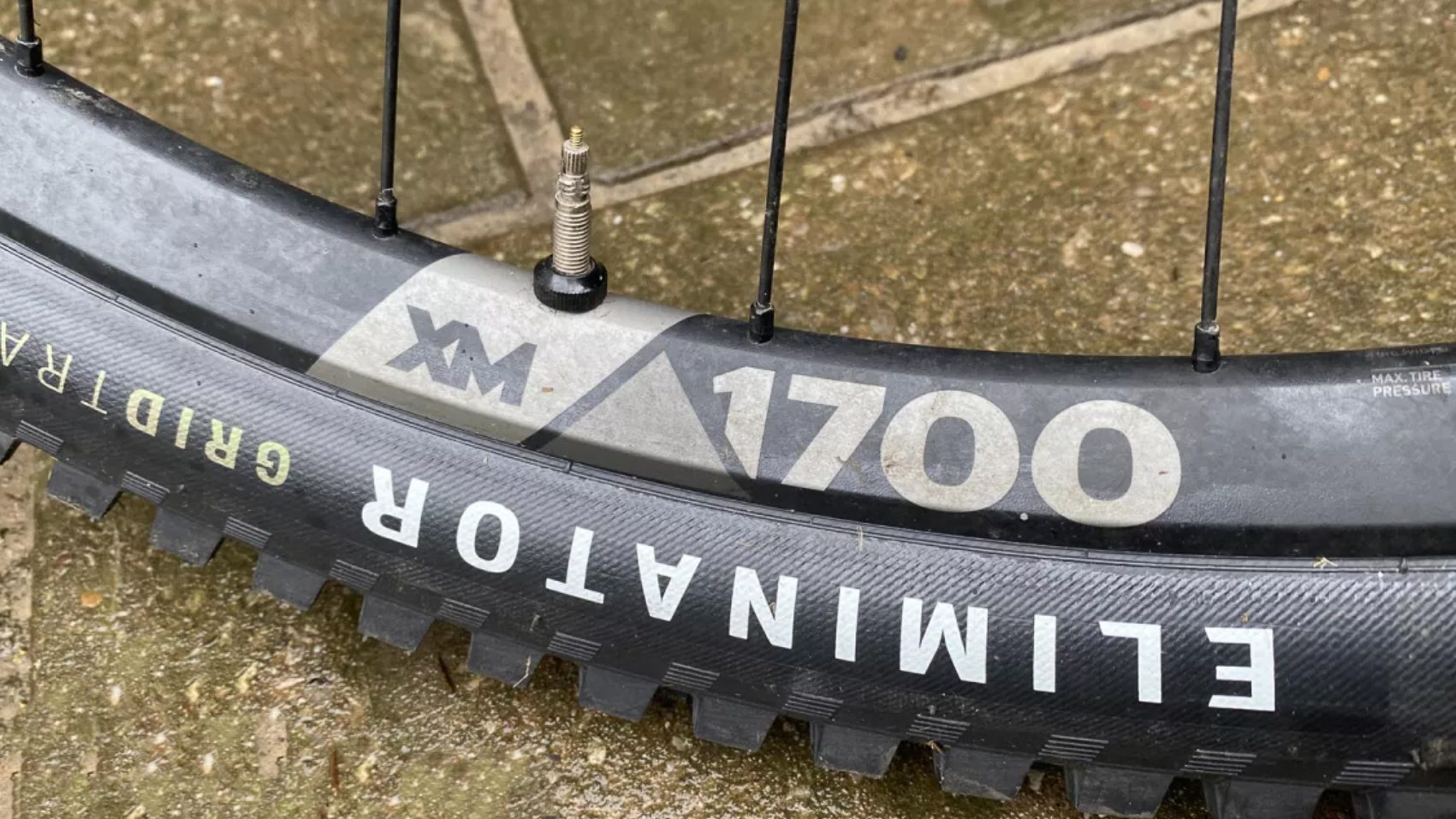
Specifications
Reasons to buy
Reasons to avoid
The DT Swiss XM 1700 are another top wheelset from DT Swiss. The brand says the XM 1700s are the all mountain rims that ‘You’d build yourself’. Although they’re not the lightest, or cheapest or instantly reactive, if you're looking for a sweet feeling, speed sustaining, minimal kickback bombproof trail/enduro wheelset, then the XM1700s are a great investment in top quality Swiss engineering.
For added toughness, DT Swiss has added more material on the sidewalls and bottom of the rim. The tough design does come with a weight penalty though, our test wheels weighed in at 1,975g, and we found them to have an accurate, stiff feeling that precision riders will love.
The main advantages we see in these wheels are the durability and the price point. If you're sick of constantly truing wheels and don't have a lot of cash to spend on a carbon pair of hoops, these beauties are a good choice.
Read our full DT Swiss XM 1700 review to find out more.
12. Best trail/enduro MTB wheels for reliability
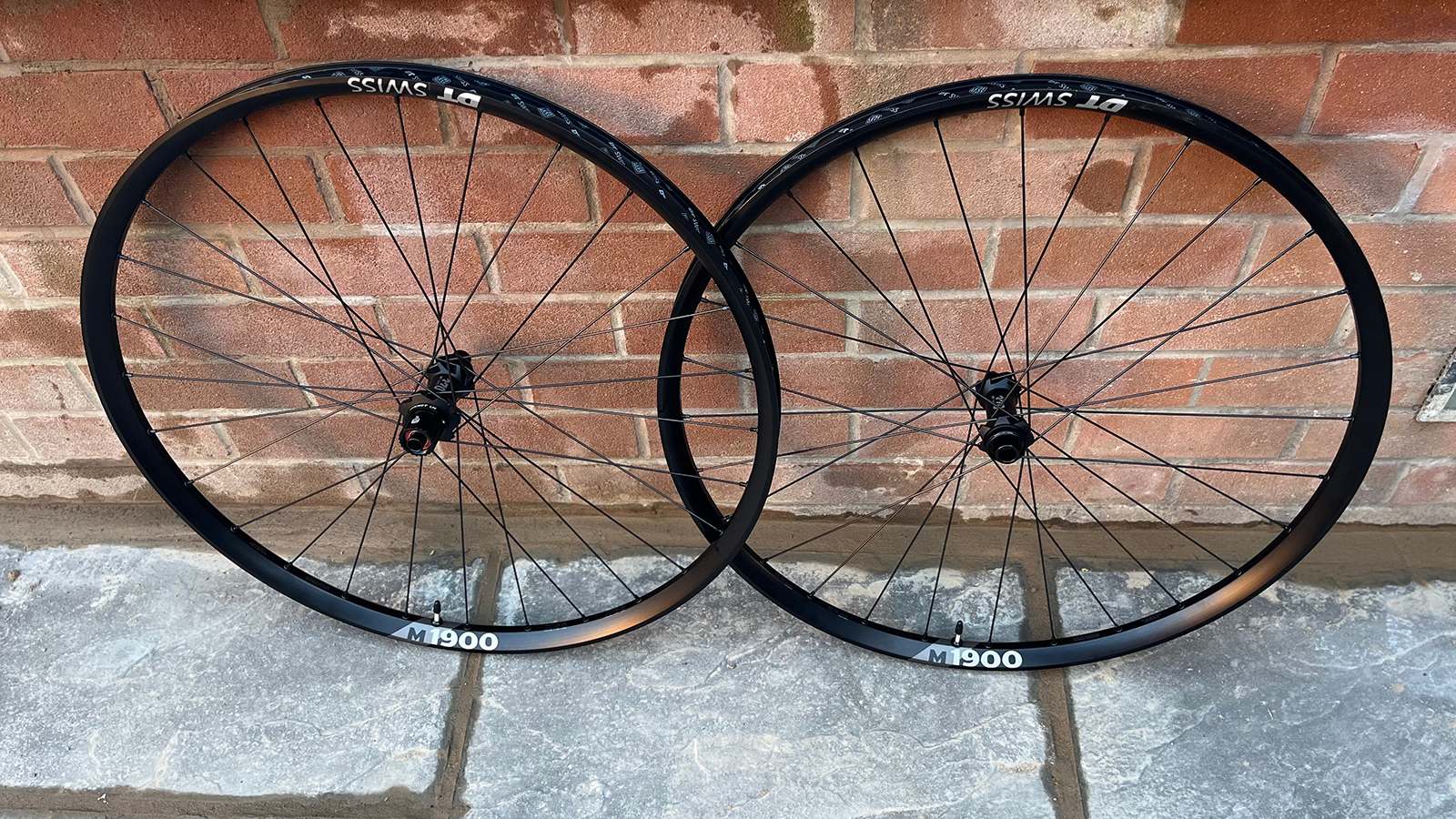
Specifications
Reasons to buy
Reasons to avoid
The Swiss masters of wheels (and hubs and spokes) have long been the benchmark for premium quality durability. The latest 1900 range aims to continue the legacy of previous versions of being some of the most reliable wallet-friendly wheelsets on the market.
For the 1900 Spline range, DT has specced its 370 hub, which now has the Ratchet LN system, which uses two spinning pieces, one driven by the hub shell and one by the freehub.
The 1900 wheel range uses two different rims; the M we tested comes with the 502 rims with a 30mm inner width, and the E and XC 1900 wheels use the E 532 rim, the little brother of the EX 511 rim, although made out of a different grade of aluminum alloy.
The M1900 uses DT’s lower-cost sleeved aluminum rims, which use a sleeved section to bond the two parts of the rim together, as opposed to its high-end wheels, which are welded. They have held up perfectly during our test, with zero damage or dings on the local rocky Peak District trails without using a tire insert.
We found they offered a real Goldilocks feel of not too stiff, not too soft, not too heavy, but not too light or skittish either. On rocky trails, they are reassuringly solid, yet on rooty wet trails where more feedback is a benefit, they offer just the right amount of feel to let you get on with riding.
To sum up, the DT Swiss 1900s are a very good, solid wheelset, perfect for high mileage riders who appreciate dependable, reliable hoops that can be serviced and kept running for years. For more info, see our full DT Swiss 1900 review.
The best mountain bike wheels for downhill riding
13. Best MTB wheels for downhill overall
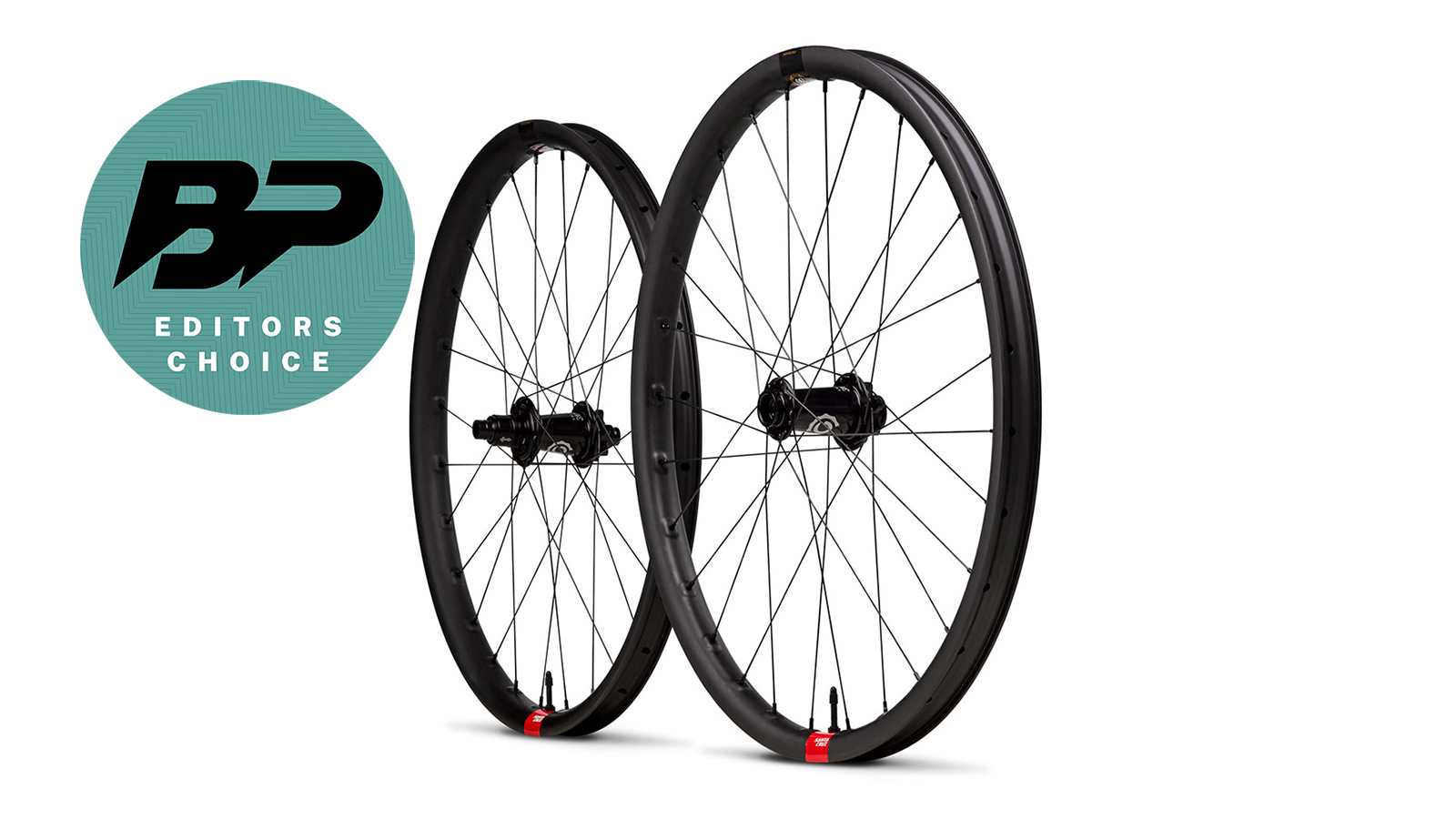
Santa Cruz Reserve DH 29er
Specifications
Reasons to buy
Reasons to avoid
Santa Cruz’s Reserve DH 29er wheels are downhill-specific carbon hoops designed to withstand the abuse and impacts of modern downhill courses. Ridden by the GOAT himself – Greg Minnaar to World Championship wins.
Available in two wheel sizes, three hub choices, and several rim widths, the Reserve 29er wheels are built with J-bend spokes with external secure-lock nipples for better consistency in terms of strength and durability – both front and rear wheels use a 28h spoke pattern.
Despite its downhill disposition, the Reserve DH rim profile features a combination of stiffness and compliance. Add to that an asymmetric rim design and offset drilling pattern, both of which promote an even spoke tension, and the Reserve might just be the most balanced carbon downhill wheel ever made.
14. Best budget MTB wheels for downhill
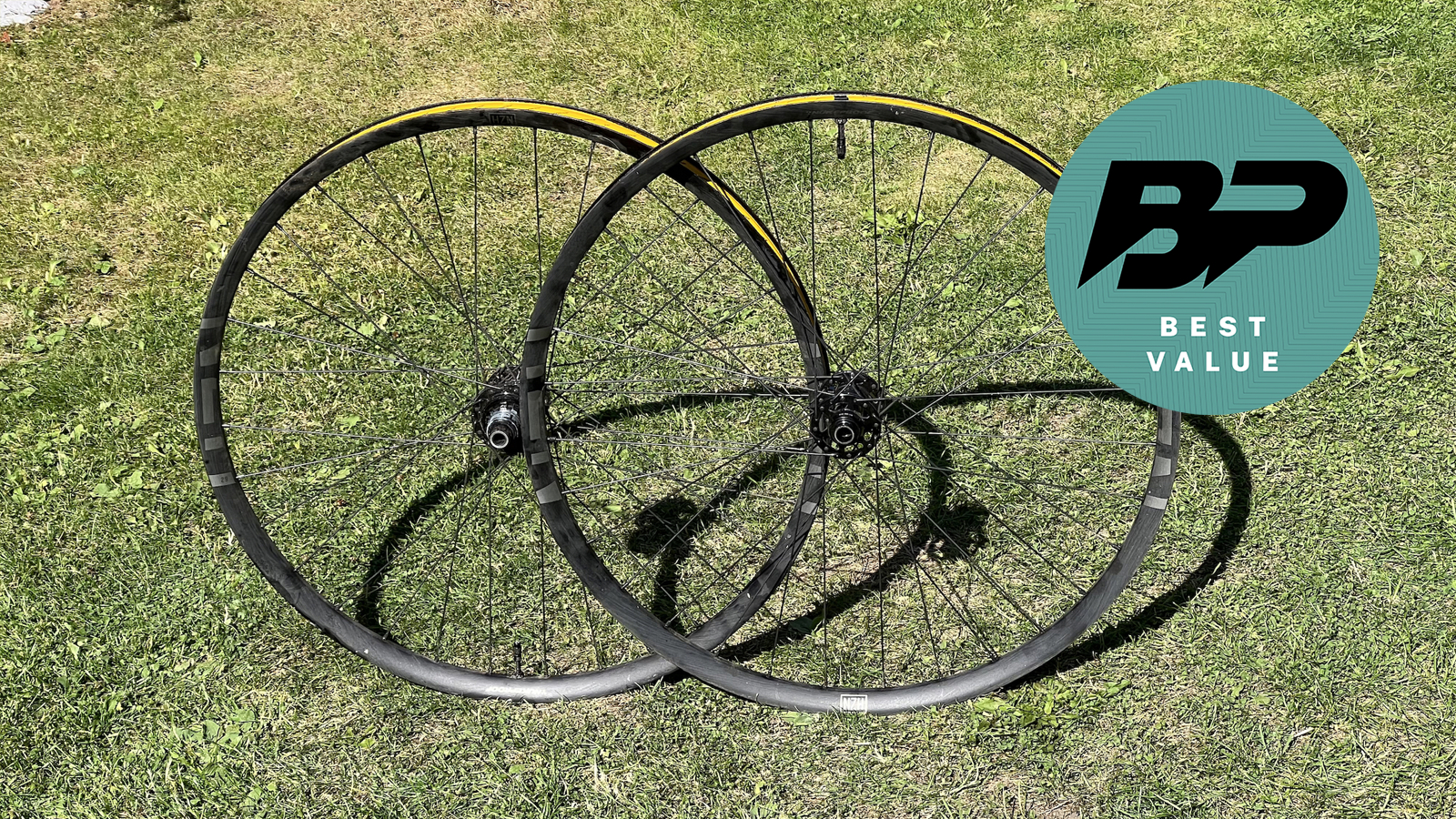
Specifications
Reasons to buy
Reasons to avoid
The Horizon from Nukeproof was already one of our favorite downhill wheelsets for durability and price, and the brand has now revised the original offering with the V2.
In our testing we gave the V2 Horizon wheelset top marks and noted that they're a great option for any privateer enduro/downhill rider looking for a solid, yet pedal responsive and well-detailed budget MTB wheelset, that strikes a great balance between cost and performance.
The updated wheels feature Boost and non-Boost options in 27.5 and 29er configurations, and are constructed out of Nukeproof's custom blend of alloy that optimizes toughness, stiffness, and weight.
The profile of the front and rear wheels are the same but the front features a thinner sidewall for weight savings. They also use J-bend spokes for easy replacement when they get battered. In addition to using Nukeproof hubs, the wheels use Enduro ABEC 5 bearings.
For more, see our full Nukeproof Horizon V2 review.
15. Best downhill MTB wheels for fast engagement
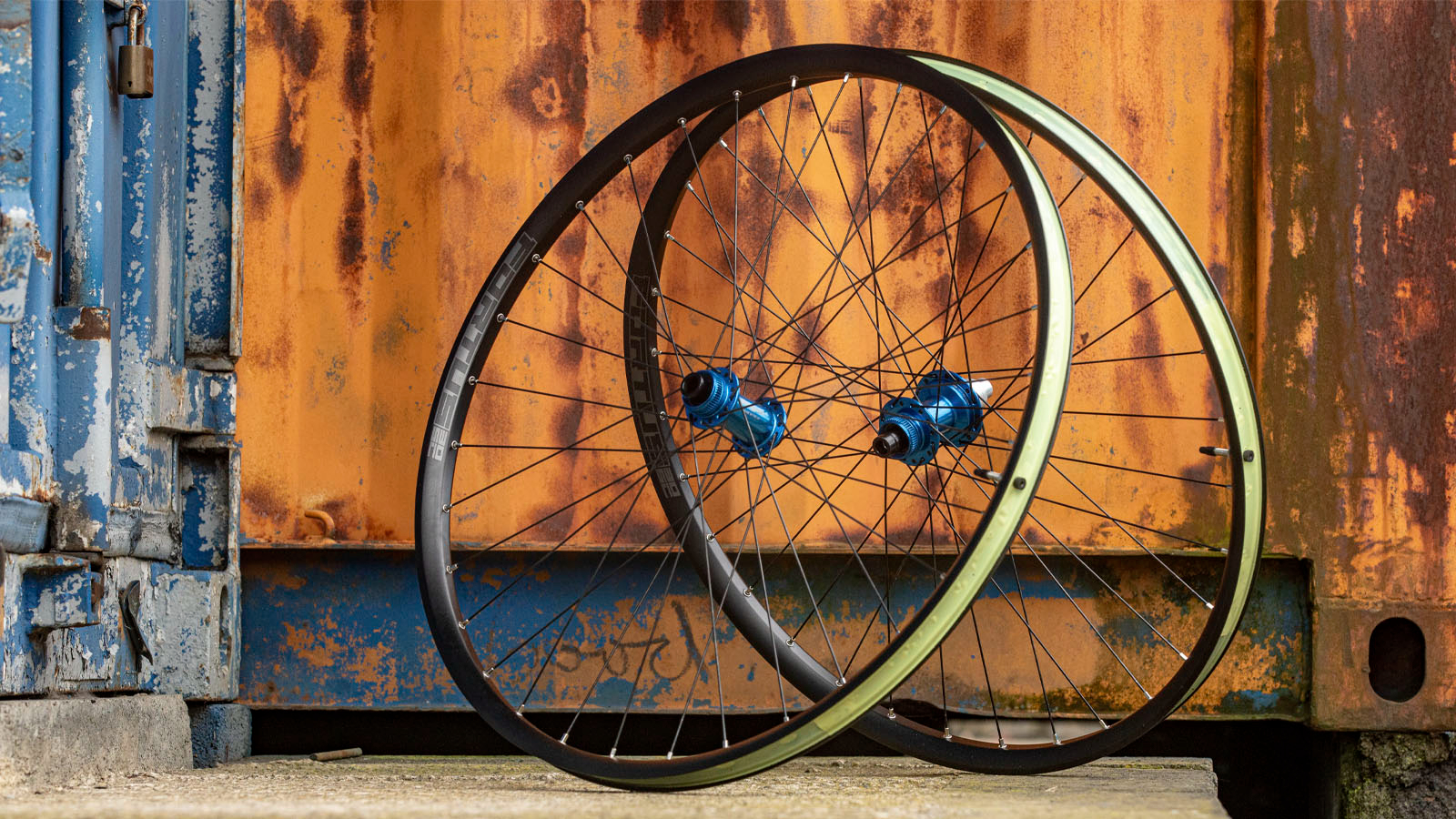
Specifications
Reasons to buy
Reasons to avoid
The Hope Fortus 30 SC Pro 5 uses Hope’s faster engaging and faster spinning hub and lighter single-cavity 30mm inside rims, balancing speed and strength.
The Pro 5 hubs have more than twice as many points of engagement than previous versions and a new offset 6-pawl freehub design in a 54t ratchet. There’s also improved sealing, which sees a new flexy labyrinth seal behind the freehub body that really snaps into place and a reduced axle diameter to accommodate larger, stronger bearings.
The Fortus SC version has a slimmer profile, omits some reinforcing bridges inside and is a lot lighter than the regular 30mm Fortus internal rim. The centerlock SC wheels we tested are 29in, use 32 Sapim race j-bend spokes with silver brass nipples, and weigh 2,070g a pair. We found spoke tension was good and didn’t loosen during testing.
We were impressed with the SCs’ performance. Stiff and direct whether stomping on cranks or chucking the bike in and out of big berms, our tires remained stable with zero burps or loss of air once seated, and they offer a comfortable and smooth ride quality that isn’t too jarring or staccato if the ground is baked rock hard or you’re smashing over repeated rocks or root webs. They feel worlds apart from the old Pro 4 Fortus 30s that always felt a bit of a dead lump and too slow climbing and getting going.
Check out our full Hope Fortus 30 SC Pro 5 review.
How to choose the best mountain bike wheels
What material is best for wheels?
Mountain bike wheels are manufactured from either carbon fiber or aluminum, both of which have their own pros and cons. Carbon wheels are stiff, light, strong, and also absorb trail buzz to a certain extent but they’re expensive. Aluminum on the other hand is a lot cheaper and, while it also delivers a fairly decent amount of stiffness and performance, rims are prone to flex and dents but can be trued and repaired – carbon not so much.
How wide should MTB wheel rims be?
Rim width has become a hotly debated topic over the years in all forms of cycling, owing to the lower rolling resistance and better grip offered by fitting larger-volume mountain bike tires. The important factor to note here is internal rim width which dictates what tires you can safely use – as a rule of thumb, the wider the rim, the greater the tire volume and contact patch with the trail. Rim widths differ vastly between cross-country, downhill, and enduro wheels, with profiles ranging from 23mm to 35mm.
How many spokes is best for MTB?
In a nutshell, spokes connect the hub to the rim and give the wheel its strength and shape. Spoke counts can differ between the front and rear wheel and the latter often employs more spokes for added strength and stiffness. Lacing patterns also vary and have different properties – some wheels are laced with two-cross straight-pull spokes for weight reduction (cross-country) while others employ three-cross-lacing patterns for better strength and torque efficacy (downhill/enduro). Spokes are made from either steel or aluminum and sometimes even carbon fiber.
What should I know about hubs and axles?
The best mountain bike hubs are constructed from aluminum or carbon composite. While the front hub is simple in function, the rear is more complex, featuring a freehub body onto which the cassette attaches. It also houses the intricate spring-loaded ratchet-and-pawl mechanism which enables the wheel to spin when freewheeling and engage the transmission when pedaling. Bigger pawls will deal better with more torque (downhill/enduro) while on the opposite end finer pawls will result in a faster engagement and better power delivery (cross-country).
Some freehubs, like those from DT Swiss and Chris King use a ratchet system rather than pawls, which provides more simultaneous points of engagement.
The need to continually improve front and rear-end stiffness has led to the introduction of thicker, more stable thru-axles that bolt directly into the fork and drop-outs. Most newer bikes offer wider ‘Boost’ axle spacing, which uses a 110x15mm front axle with a 148x12mm rear thru-axle for added levels of stiffness.
How we test the best mountain bike wheels
All the wheels tested here are ridden over several months and many, many miles in grueling conditions on all kinds of MTB trails. We test them in bone-dry conditions as well as filthy and wet to see how the wheel internals stand up over time and if the bearings and seals can take a beating.
Meet the testers
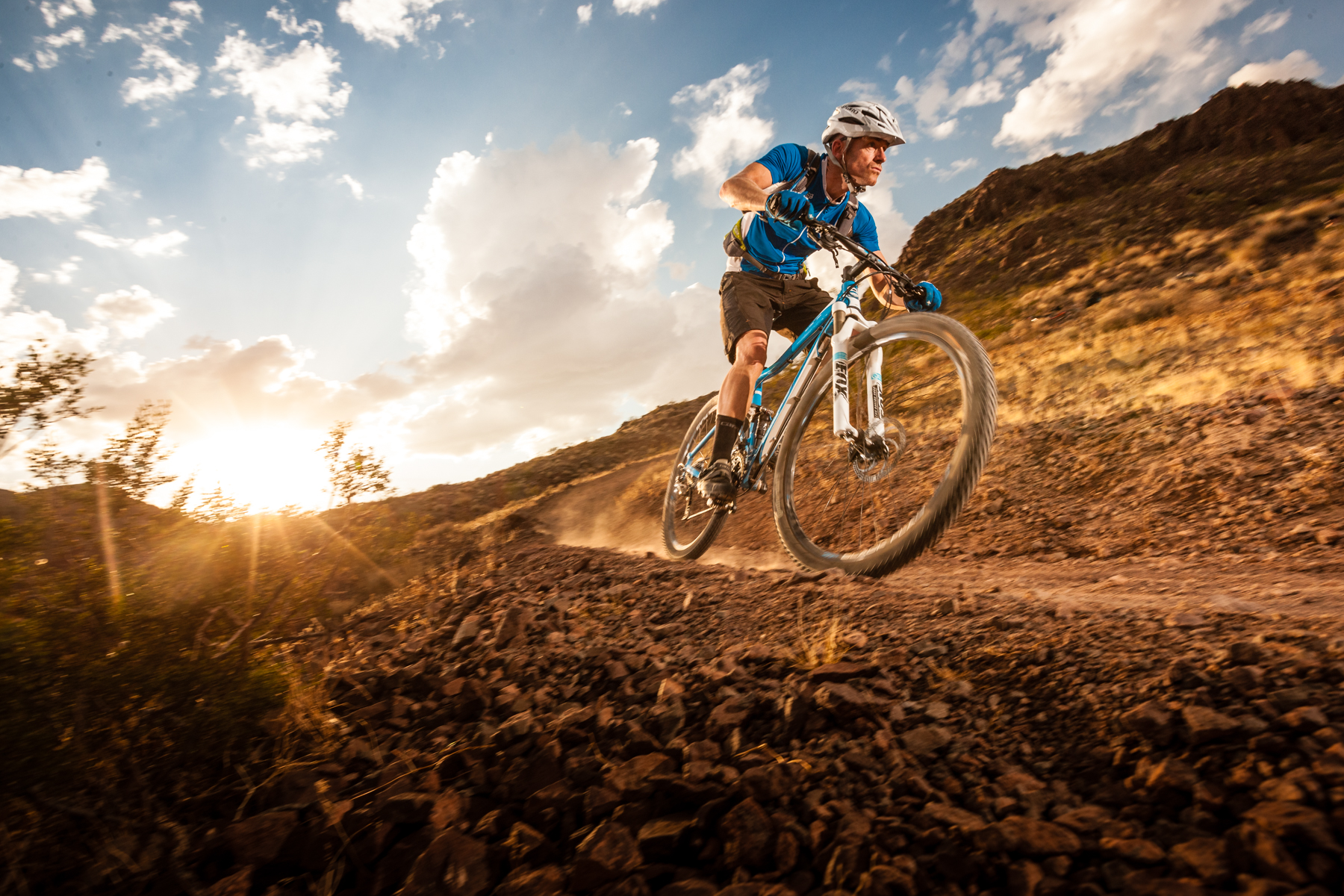
Guy Kesteven is Bike Perfect’s tech editor. He spent a few years working in bike shops before starting writing and testing for bike mags in 1996. Since then he’s written several million words about several thousand test bikes and a ridiculous amount of bike components and riding gear.
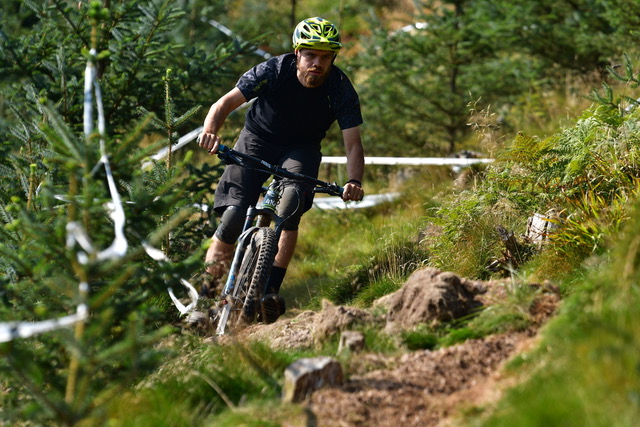
Graham is all about riding bikes off-road. Based in Edinburgh he has almost 20 years of riding experience, and has dabbled in downhill, enduro, and gravel racing.

Neal has been riding bikes of all persuasions for over 20 years and raced them, from town center criteriums to the Megavalanche and pretty much everything in between. Neal has worked in the bicycle industry his entire working life, and has built an in-depth knowledge and love of all things tech.

An ex-elite downhill racer, Mick's been mucking about and racing mountain bikes for over 20 years. He's tested all manner of wheels so knows exactly what works and what doesn't.
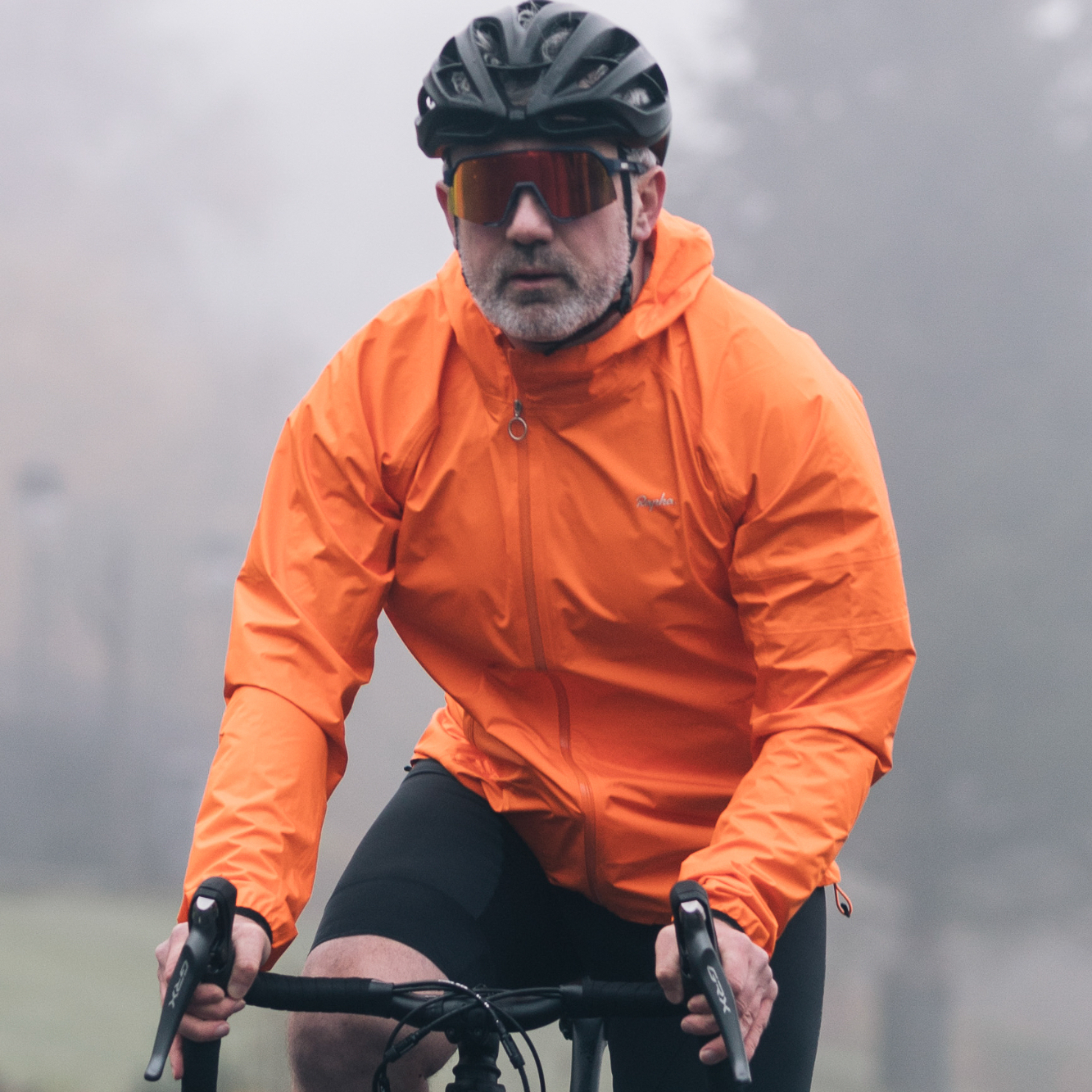
Paul Brett joined BikePerfect as a staff writer in 2022. He has been an avid cyclist for as long as he can remember, initially catching the mountain biking bug in the 1990s, and he raced mountain bikes for over a decade before injury cut short a glittering career. An award-winning photographer, when not riding a bike, he can be found at the side of a cyclocross track or a downhill mountain bike world championship shooting the action. Paul was the founder, editor and writer of Proper Cycling magazine, and he's traveled the world interviewing some of the biggest names in mountain biking and writing about some of the biggest cycling brands.
Current rides: Canyon Inflite, Specialized Diverge, Marin Alpine Trail 2
- Guy KestevenTechnical-Editor-at-Large
- Neal HuntFreelance Writer
- Mick KirkmanFreelance writer
- Graham CottinghamSenior reviews writer, Bike Perfect
